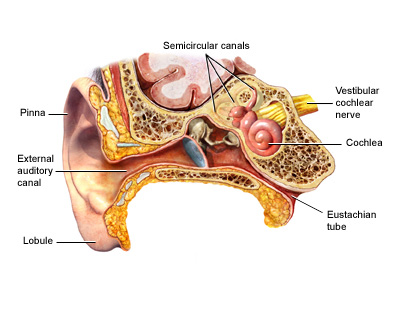Tinnitus - ringing in the ears
Tinnitus is the medical term for "hearing" noises in your ears when there is no outside source of the sounds.
Tinnitus is often described as a ringing in the ears. It also can sound like roaring, clicking, hissing, or buzzing. It may be soft or loud, high pitched or low pitched. You might hear it in either one or both ears.

The ear consists of external, middle, and inner structures. The eardrum and the 3 tiny bones conduct sound from the eardrum to the cochlea.
The noises you hear can be soft or loud. They may sound like ringing, blowing, roaring, buzzing, hissing, humming, whistling, or sizzling. You may even think you are hearing air escaping, water running, the inside of a seashell, or musical notes.
Considerations
Tinnitus is common. Almost everyone notices a mild form of tinnitus once in a while that only lasts a few minutes. However, constant or recurring tinnitus is stressful and make it harder to focus or sleep.
Causes
It is not known exactly what causes a person to "hear" sounds with no outside source of the noise. However, tinnitus can be a symptom of almost any ear problem, including:
- Ear infections
- Foreign objects or wax in the ear
- Hearing loss from loud noises
- Meniere's disease -- an inner ear disorder that involves hearing loss and dizziness
Alcohol, caffeine, antibiotics, aspirin, or other drugs can also cause ear noises.
Tinnitus may occur with hearing loss. Sometimes, it is a sign of high blood pressure, an allergy, or anemia. Rarely, tinnitus is a sign of a serious problem like a tumor or aneurysm.
Home Care
Tinnitus can be masked by competing sounds:
- Low-level music, ticking clocks, or other noises may help you not notice the tinnitus.
- Tinnitus is often more noticeable when you go to bed at night because your surroundings are quieter. Any noise in the room, like a humidifier, white noise machine, or dishwasher, can help mask tinnitus and make it less irritating.
Learn ways to relax. Stress does not cause tinnitus, but feeling stressed or anxious can worsen it.
Avoid caffeine, alcohol, and smoking.
Get enough rest. Try sleeping with your head propped up in an elevated position. This lessens head congestion and noises may become less noticeable.
Protect your ears and hearing from further damage. Avoid loud places and sounds. Use earplugs if you need them.
When to Contact a Medical Professional
Call your doctor or nurse if:
- Ear noises start after a head injury.
- The noises occur with other unexplained symptoms like dizziness, feeling off balance, nausea, or vomiting.
- You have unexplained ear noises that bother you even after self-help measures.
- The noise is only in one ear and continues for several weeks or long.
What to Expect at Your Office Visit
The following tests may be done:
- Audiology/audiometry to test hearing loss
- Head CT scan
- Head MRI scan
- Blood vessel studies (angiography)
TREATMENTS
If your doctor can determine the cause, fixing the problem (for example, removing ear wax) may make your symptoms go away.
Review all of your current medicines, including over-the-counter drugs, vitamins, and supplements with your health care provider. Do not stop taking any medications without first talking to your provider.
Many medicines have been used to relieve symptoms of tinnitus, but no drug works for everyone.
A tinnitus masker worn like a hearing aid helps some people. It delivers low-level sound directly into the ear to cover or disguise the ear noise that is bothering you.
A hearing aid may help reduce ear noise and make outside sounds louder.
Sometimes, counseling may help you learn to live with tinnitus. Your doctor may recommend biofeedback training to help with stress.
Some people have tried alternative therapies to treat tinnitus. However, such methods have not been proven. Talk to your doctor before trying any of these alternative therapies.
The American Tinnitus Association offers a good resource center and support group.
Prevention
Wear ear protection in any situations where ear damage is possible (such as loud concerts or jackhammers). If you have hearing loss, avoid further damage to your hearing by avoiding excessive noise.
Alternative Names
Ringing in the ears; Noises or buzzing in the ears; Ear buzzing
Source: http://www.nlm.nih.gov/medlineplus/ency/article/003043.htm

